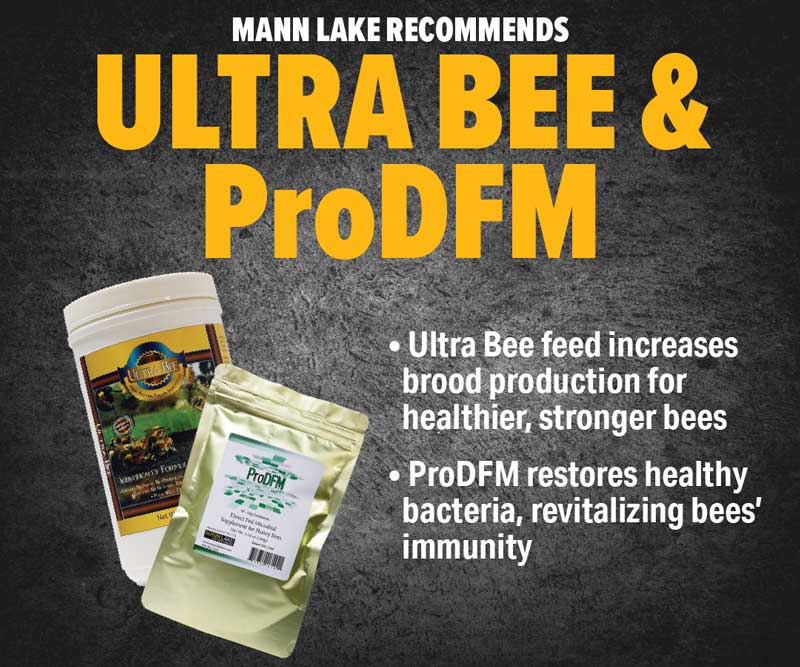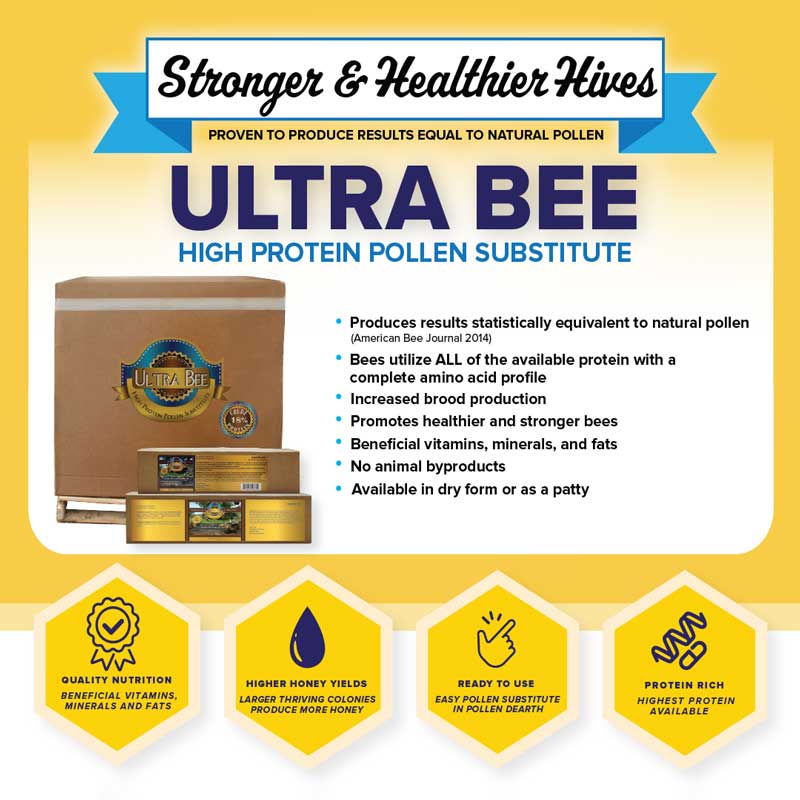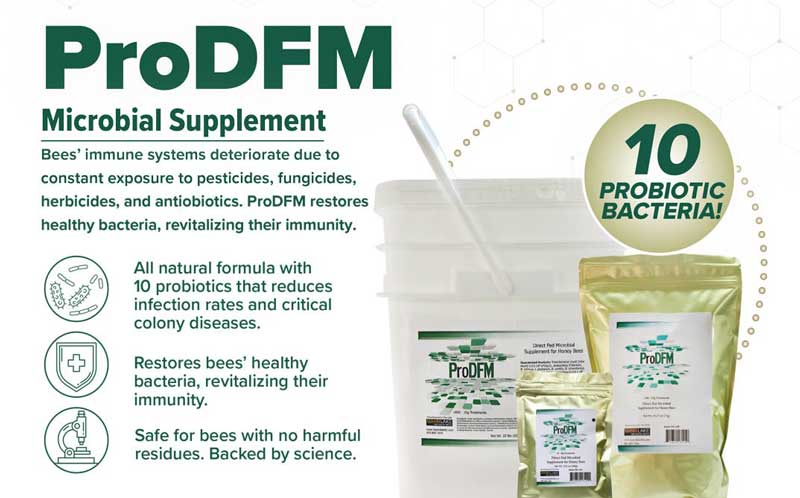Pollen Substitute & Microbial Supplement
The How, Why, and When You Should Feed Pollen Substitute to your Honeybees!
When spring comes along, a honey bee colony will start to expand. To
do this, the colony needs plenty of pollen to feed its brood. A well-fed brood
turns into a healthy population of worker bees that can forage for
resources, make honey, and help the colony achieve success throughout the
season. Unfortunately, the weather and climate don’t always make it easy for
your honey bees. Lingering cold weather, heavy spring showers, and other
complications might prevent flowers from blooming or keep your honey bees
inside longer than is ideal. That’s why it’s helpful to have pollen substitutes such as Ultra Bee on hand to supplement your hive until they can gather
enough resources for themselves.
Keep in mind that every honey bee colony is different. Pay attention to your local climate and the resources available to your hives. While pollen patties, sugar water, and other solutions are a great way to supplement your hives when they can’t gather resources themselves, you don’t want your honey bees to become reliant on you. You also don’t want your colony to grow too much too quickly. Pay attention to your colonies’ needs and the natural pollen flow of your environment to know when to give them pollen supplements.
Why & When to Feed Pollen Substitute?
If you have a strong, year-round, multi-source pollen flow, you don’t need a pollen substitute. Chances are this is not the case for you. There are major summer droughts, freezes, winter, etc. that prevent the quantity and quality of natural pollen needed.
Feed Pollen Sub to
Accomplish Three Primary Goals:
1. Feeding our bees two to three months before the first freeze will help them raise healthy bees for the winter by making sure they have all the nutrition they need to raise brood. In essence, workers rear a separate breed of bee during the late summer and early fall months—a "winter bee" that is bred to survive a lot longer than summer bees. To have the fat reserves and immune systems required to survive the winter, these bees need a very full diet. They won't be able to produce healthy winter bees if there is a weak pollen flow or a single source of pollen that is nutritionally deficient. If necessary, feed them pollen substitute and syrup to ensure they have the necessary nutrients and protein to effectively raise winter.
2. To prolong the brood rearing. You can encourage bees to grow brood later and for a longer period of time than usual by providing pollen replacement about a month after the first freeze and two weeks before your first pollen-flowering plants in the spring. No matter the season, this helps the hive's population grow.
3. Hives may start to starve if there is insufficient pollen and pollen diversity
present if we have a dry summer or a late spring freeze and little to no pollen-producing
plants. When this occurs, the bees start eating their own brood, drastically
depleting the hive's resources and population. During severe shortages, feeding
syrup and pollen substitutes to your bees can preserve them.

Scientifically developed to provide the best bee nutrition, Ultra Bee has been proven to match natural pollen’s results in the field by providing a complete amino acid profile that allows bees to make the most of the beneficial vitamins, fats, and minerals that they need to be at their best.

Be Proactive. Experience ProDFM.
ProDFM is backed by Science. Studies show that bees containing healthy gut microbes with Lactic Acid Bacteria have consistently shown to have reduced spore loads against disease-causing pathogens.

Increased detoxification of pollutants and harmful chemicals
- Revitalizes gut after times of stress such as transport and commute out of winter weather
- Promotes digestion to better handle pollen dearth
- Creates stronger more robust colonies going into winter
- Helps improve bee colony health
- All natural formula with 10 probiotics that reduces infection rates and critical colony diseases
- Restores bees' healthy bacteria, revitalizing their immunity
- Safe for bees with no harmful bacteria
- Microflora positively affects nurse bees vitellogenin reserves. Vitellogenin is aprecursor of egg yolk that transports protein and some lipid through the blood to the growing oocytes where it becomes part of the yolk. The health of honey bee colony is dependent upon vitellogenin reserves of the nurse bees.
- Aids in fermentation and digestion of beebread
- No resistance by bees
- Quick and easy to use
- Yeasts help synthesize B-vitamins needed for bee health.
Ultra Bee
ProDFM

